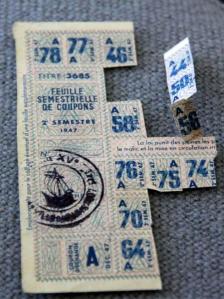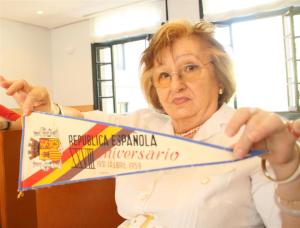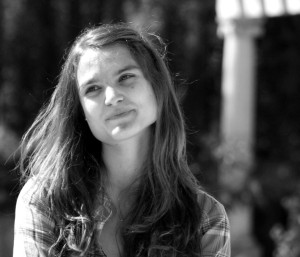First Margarita was interviewed by Marta as a preparation of the seminar and her story was so amazing that we arranged another meeting with a group from during the interview.
Margarita was born in Madrid in 1935. She belonged to the upper class and her father collaborated with the Republic Government as Director of Public Prosecutions. At the end of the Spanish Civil War, they had to pass the frontier and struggle to make ends meet in their new life in Paris. Those were not happy times for Margarita as she was hungry and cold and had no friends at school; then, when she was getting used to the new country, the family decided to migrate again to Venezuela. There she has been all her life, she got completely adapted to her new life and got married and had two children there; on the contrary, her parents lived all her life waiting for the return to Spain.
In the 80’s, due to personal problems, she decided to return to Spain, where she was well received by her family but with whom she had a radically different way of thinking. Now she is retired and collaborates with the Spanish Exiled Descendant’s Association.
If you are interested, read the full interview:
1. When and why did your parents exiled?
My father was the Director of Public Prosecutions, in Jaén. When Franco won the war, they were collaborators of the government and had to flee the country not to be persecuted. We passed at the end of the war, in 1939.
2. How was it the reception in France?
It was really mean because France wasn’t ready for the wave of people who came.
Yesterday it was 14th July I was invited to the French Embassy – as I am invited every year as my father collaborated with the special army against the Nazi brigades – and the ambassador recognized that the reception is nowadays a disgrace for France, but if we think about it, they couldn’t have done more. What did they do? They opened the border and put a row of black soldiers, brought from Senegal, tall and strong, that frightened my mum up to the point she thought she had forgotten the French she learnd at school ‐ San José de Cluny – but in fact the Senegalese didn’t speak French but “petite negre”, the only thing they said was “allez, allez, allez”, that is “go, go”, and when you passed the border, men were put into a row and women and children were put into a different one, they separated the couples. So they thought in France they would find happiness and freedom and they found themselves crowed together in concentration camps, fenced beaches where there was nothing: no roof, no awning, no toilets, like it was the case of “Arselles sur mer” and some others. They were there for a long time, the anecdotes are terrific, they had to bury themselves in the sand to avoid being cold and dig holes to bury their excrement; there were many diseases and people death. The Red Cross was there helping, when we passed the border they gave us a distasteful but hot leek soup; they also helped couples separated in two different camps to keep in touch by telling new and passing letters out.
Nowadays France has recognised the memory of the exiled dead in camps and has built monuments; in contrast Spain hasn’t yet recognised them. Yesterday the ambassador was asking how it was possible that these Spaniards who were so badly treated, not long after joined the French Interior Army up to the point that the first tanks which passed the Triumph Arc the day of the Paris liberation were singing Riego’s hymn: they were Spanish.
3. Once installed, how was your life in France?
In France it was forbidden for the Spanish emigrants to work, so to survive, my father had to work as the suitcase boy at Austerlitz’s train station and living on the tips; my mother painted the typical Paris monuments – the Eiffel Tower, the Sacre Coeur, the Opera – in handkerchiefs and sold them to American tourists at the “Rue de Rivoli”. During the occupation, daddy had to work in a plane factory, just in the moment it was beginning the assembly‐line work12, he had to put 6 or 8 screws on a fuselage and he only put 4, it was a way of sabotaging, for the planes fall over, and if he was caught he would have been taken to an extermination camp.
I had very bad memories of that times, I remember being frightened of the police asking for the “papiers”, because if they asked you and you didn’t have them they send you home in 24 hours, and since then I am obsessed with saving all papers.
My brother was born in 1940, he was born with rachitis and asthma, and my
mother had problems given birth and she didn’t undergo an operation, they didn’t want to save her, for them she was a Republican and she’d better be death. Our means of living were very low, especially for the ex‐ Director of Public Prosecutions and a girl educated at Cluny’s School, my grandmother was the dressmaker of the Queen Maria Eugenia, I still have letters from her and a ring, so we were completely miserable. Each of us had a ration book and I had a pair of shoes for all the year, so, imagine, 4 months later I had no longer shoes, and my father had to make a new pair out of wood and leather. But Paris was 14º under zero, so we were hungry and cold. The rations depended on the age, my brother was E5, I had E7 and I remember I was obsessed with the J3, I hated them, I wanted to found one and tell him everything I thought of them, because while I had 1/8 of milk he had steaks and a lot of things, and then I found out they were the young boys between 18 and 21, that is, the possible soldiers, the reserve.
Many days I wouldn’t go to school because I had to queue to get the products of the ration book. School was compulsory but for getting the rations I had to go to 4 quarters to 4 different bakeries, so my mum sent me, and I was always caught in
some of the queues by the police and they took me home and asked my mother and
she trained to explain them our situation but I had still to go to school, I went for
some days and then after I returned to queuing. And then in school children were
very cruel with me, because as I didn’t know French I was in the kindergarten, with children 3 years old learning how to speak, so children of my age laughed at me, calling me “retard”. Once they called me “espèce d’andouille”, they said that smiling so I thought I had made a friend and was quite happy, and then my mother told me that was very rude, like calling me fool13. And they even tied me to a tree with another girl that in the end became my best friend, a Polish, and they said to us “parle, parle!”. At the end only for sheer proud I learn French and in 4 months I got a “bon point”, an award to the best French reader in the school. Since then I was happier, I started to have friends and take my little brother to the park, and play with children of my age, I was getting adapted to the country, until one day my parents came and told me we were going to America.
4. Why did they decide to emigrate again?
Because my parents couldn’t work, we were cold and hungry, and there was no heating. The rooms of my bedroom had ice and we had to scratch it before sleeping so that it would melt with our body heat and wet the bed.
5. Where and how did you emigrate?
We were going to Argentina but they closed the border and it was also closed in Mexico because they had fulfilled the quota, so it rested Venezuela. When we
arrived we had to go to immigrants’’ hotel. To Mexico the exiled arrived by ships sent by president Cardenas, but in Venezuela immigration was minor, there were no government pacts, but they accepted us because there was a left winded party on power, that of Rómulo Gallegos.
6. How was the exiled community in the country?
We the political exiled arrived by ship, but son after economical exiled, as people couldn’t live on their means in Spain. And I remember my father forbid me to speak to them to the Spaniards “of Franco”. I asked why then they were there and my father would say because they were poor in Spain, but they had supported Franco’s regime, they were traitors to the fatherland. So in fact there was the same division, and in fact Venezuela didn’t recognised Franco’s regime, not until Pérez Jiménez seized the power, by a coup d’état in 1958 against Rómulo Betancourt. But I have no idea about politics, I hadn’t been activist and actually I consider myself a victim of politics.
7. What was your relationship, as exiled, with Spain?
My parents lived all the time looking to Spain, they thought the regime would
finish very son and we would come back to Spain. For them the exile was a brief break, they never had a plenty life in Venezuela. They didn’t allow me to get marry, at 16 they shut me in my room because I had boyfriend, and I would never marry an unknown, I would get married in Spain with the rightful man. They lived there waiting, when my mother died in 1969 I opened the chest with the table linen she had been keeping there since when we left Spain as it would only be opened when we returned. All of them died in exile, the only one who returned was me.
8. When and why did you return to Spain?
I got married with a Cuban, and we were very happy during 30 years, we had two children, one of them is nowadays professor of Architecture at Barcelona’s
University and the other one is a radio presenter at Venezuela. But in the 80’s he decided he preferred a younger girl and we got divorced; the situation was very hard for me and so I decide to return to Spain, now that I needn’t to be faith to anybody.
9. What kind of papers did you have?
As Spanish exiled I had no papers, there was an international organization that
give us an accordion–passport, that gave international recognition to the political refugees. There it was written “place of birth: Madrid; Nationality: stateless”. Serrano Suñer, asked by Hitler what to do with the 2,000 Spaniards the Nazis had in their lands, answered him he could do what he wanted as “Spanish are only the ones who are in Spain”, so we were stateless; many died in extermination camps. Nowadays there are many exiled but in those these it was only us and the Russians expelled after the revolution, so it was funny how two people of completely different ideology were queuing together, getting food from the same institution.
Even in Venezuela I had no Passport so in the 60’s, I needed to travel to Peru and so I went to the Spanish embassy, “Franco’s embassy” as my father called it. There I showed my Birth Certificate and the made my passport without problems. However they put I was “single”, because I wasn’t married by the Church, and they didn’t recognise my marriage. The consul received me personally and gave me a lecture, I was only 22, and he asked me if I didn’t realise that maybe one day the Cuban may leave me with my two children; and I responded that if he had to live with me only because he was married by church instead because he loved me, I preferred him to leave me. So I asked for the Venezuelan nationality by marriage and now I have double‐nationality. Until then I was stateless.
10. Did you have problems in Spain?
When I arrived here I looked my family at the phone book, my name is unique for my family, and all of them but my mother were francoists and had rested in Spain, there was a big familiar fuss and in the first days they took me in their houses. I looked for a job, with 56, I joined a temporary recruitment agency –just when they were appearing in Spain‐ and that same day I found myself doing a substitution. The last 16 years I have been working as a secretary, I worked for a big commercial enterprise and then for a big energy supplier, I was the secretary of the president and when he was substituted, he put as a condition that I couldn’t be retired until 71, so that I have worked for 16 years and I could draw half a pension.
11.What difference can you tell between someone who has been brought
up under the Spanish dictatorship and someone brought up in exile?
My father always spoke highly of Spain, the Spain of the Republic, and I had an idea very different from the Spain I actually found. He would talk about a Spain in which it wasn’t necessary to sign a contract because the word of honor was enough, when hands were shaken the pact was sealed; and then when I arrived to Spain I obviously got cheated everywhere. The Republic was very concerned about education and culture; it was the only moment in our history when the military were not in power, it was the moment of the 98 generation and the 27 generation, my father knew Garcia Lorca, Unamuno, Valle‐Inclan. I had that idea of Spain and when I arrived I found a very different Spain. Now I have concluded that Spain is a very normal country, with its good points and its faults, but it has a mentally absolutely influenced by totalitarianism, it’s obvious, for 40 years people had not been allowed to think; they had to follow the line, books were forbidden, the plot of films was changed, there was no Little Red Riding Hood but Little Blue Riding
Hood. So there are deep traces, maybe not amidst the young, but within my
generation you have to speak carefully; people are wounding, offensive, gossip.
They ask you directly “this flat is yours or rented?” “How old are you?” I can’t
understand why they make this kind of question, if you did the same in France you are considered very rude, why do they love so much to know about other people’s lives? There is class resentment, they say: “look at the car he has bought, despite his salary…” and I wonder what do they mind, in fact, if he is my friend is better he has a car or a ship so he can lift you. Life is very different, because people haven’t go out of Spain, they are close‐minded. The exiled have another concept of solidarity, of brotherhood. Friends are the family you choose: he who shared his bread when you haven’t, he who hosted you when you were persecuted; so the ties are deeper. I am used that it a friends passes by my house he pays me a visit and I invite him to my table; in contrast, with my family I have to set a date to go because they want to give me very good food and boast about their wealthy, when what I want when I go there is to talk to them about my family and things I never came to know.
12.What is your evaluation of exile?
In reality it was a bad experience, we were miserable. I am of noble birth and I
have seen my house shared out among members of my family. I wish I have stayed in Spain, in the Spanish Republic. Only during that period did we have freedom because there was culture; the first thing Franco did was to persecute the teachers, he knew thinking gives freedom, releases you from following the crowd. In France and Venezuela there was complete freedom, I’ve been able to read everything, nothing was censured, and that woke up my spirit of research and my wish of knowledge. You can’t enlarge your life but you can broad it, living in another country, learning the survival fight with other people, and you realise there are no clichés about countries. There are good and bad people everywhere; I don’t believe as others that I’m better just for being Spanish, for my mother gave birth in this land and not in other part of the world. I have heard a relative saying that being Spanish is a title, that people think they are the navel of Budda, the right leg of apis.
So narrow‐minding hurts me. I am concerned about what happens in France and in
Venezuela, but the only country that hurts me is Spain, because I learnt to love a Spain that won’t be any more. So in the end I have seen the bright side of the
experience, but in reality I wouldn’t like the exile for anybody, because is to live
without land, without citizenship rights, knowing nobody responds of you.


